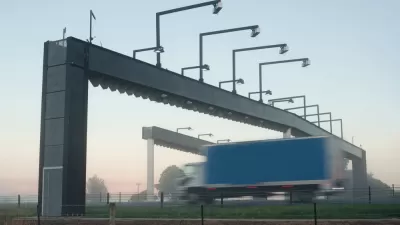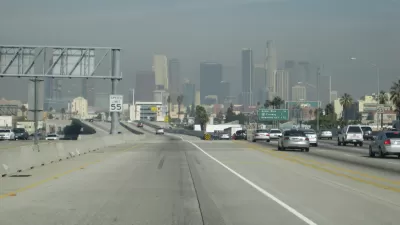What is the future of the "deeply flawed" state gas tax? Lemov Penelope compares the approaches taken by VA and OR - both plan to eliminate it and replace it with alternatives - a state sales tax and a vehicle-miles-traveled (VMT) fee, respectively.
Penelope is not optimistic about the future of the state gas tax.
Every tax has its problems, but the state gasoline tax seems more deeply flawed than most. That's largely because the gas tax in most states isn't indexed to the rising cost of fuel; rather, it sits fixed at a per gallon fee. Meanwhile, cars are becoming more efficient and using less gas. In short, the gas tax has been going broke.
Comparing the plans of Virginia and Oregon has merits as both recognize the dim future of a stagnant gas tax. Of course, a third approach would be to 'fix' the state gas tax - by indexing it to inflation - or by converting the excise tax to a sale tax - or simply by increasing it a few cents, but that approach is not examined, nor mentioned in her piece that looks at two alternatives to the gas tax.
To get a handle on the economics of these diametrically opposed approaches, I talked to George Hoffer, a transportation economist at the University of Richmond. As a Virginian, he follows the Virginia plan closely, but he has also written at length about the Oregon approach (PDF).
Hoffer states, "Traditionally, there's been a link between using roads and highways and paying for them, and Virginia has always financed roads with user fees. But it's a break in other ways. It takes us in a direction that's 180 degrees from where public policy has been taking us since 1974 when the federal government passed the first fuel efficiency standards. The proposal would charge owners of an electric vehicle or hybrid car an additional $100 for the annual registration fee. This would make sense if you were doing a fuel tax but not if you're doing away with the fuel tax."
The Atlantic Cities' Eric Jaffe, calling the VMT fee the "most compelling replacement for the gas tax", provides a close-up look at the 5-option Oregon plan to charge drivers by the mile driven designed to overcome the most serious objection to VMT fees - the use of global positioning systems to track drivers, referred to as privacy concerns.
The five tracking plans vary in terms of oversight. Two are managed by the Oregon D.O.T., three by a third-party vendor.
We have to somehow, some way, have people tell us how many miles they've driven," says Mary Olson, a commissioner at the state's department of transportation, and also a participant in the latest pilot. "If you want to use technology to do that, you run into privacy issues. Some people are very sensitive about that. Other people like me don't care at all. You can't have one solution. You have to have multiple solutions."
Olson offers an opposing view to what Penelope called one of "the most flawed" means of collecting transportation revenue.
"The gas tax is a perfect tax. It's not invasive on the person using it and it requires very little effort on the agency that depends on that money for providing services," says Olson. "Trying to replace that is really difficult, because anything you try to do is so much more complicated than just pulling up to the pump and paying for gas."
Jaffe earlier looked at the 'third approach' to the future of state gas taxes - increasing it. He wrote about plans from Minnesota, Massachusetts, and Maryland and also on the federal level.
All three approaches have their challenges, but do keep an eye on Oregon and Virginia as each is the most advanced in ditching the state gas tax and replacing it with a different transportation funding approach.
FULL STORY: What to Do About the Gas Tax?

Alabama: Trump Terminates Settlements for Black Communities Harmed By Raw Sewage
Trump deemed the landmark civil rights agreement “illegal DEI and environmental justice policy.”

Planetizen Federal Action Tracker
A weekly monitor of how Trump’s orders and actions are impacting planners and planning in America.

The 120 Year Old Tiny Home Villages That Sheltered San Francisco’s Earthquake Refugees
More than a century ago, San Francisco mobilized to house thousands of residents displaced by the 1906 earthquake. Could their strategy offer a model for the present?

In Both Crashes and Crime, Public Transportation is Far Safer than Driving
Contrary to popular assumptions, public transportation has far lower crash and crime rates than automobile travel. For safer communities, improve and encourage transit travel.

Report: Zoning Reforms Should Complement Nashville’s Ambitious Transit Plan
Without reform, restrictive zoning codes will limit the impact of the city’s planned transit expansion and could exclude some of the residents who depend on transit the most.

Judge Orders Release of Frozen IRA, IIJA Funding
The decision is a victory for environmental groups who charged that freezing funds for critical infrastructure and disaster response programs caused “real and irreparable harm” to communities.
Urban Design for Planners 1: Software Tools
This six-course series explores essential urban design concepts using open source software and equips planners with the tools they need to participate fully in the urban design process.
Planning for Universal Design
Learn the tools for implementing Universal Design in planning regulations.
Clanton & Associates, Inc.
Jessamine County Fiscal Court
Institute for Housing and Urban Development Studies (IHS)
City of Grandview
Harvard GSD Executive Education
Toledo-Lucas County Plan Commissions
Salt Lake City
NYU Wagner Graduate School of Public Service





























